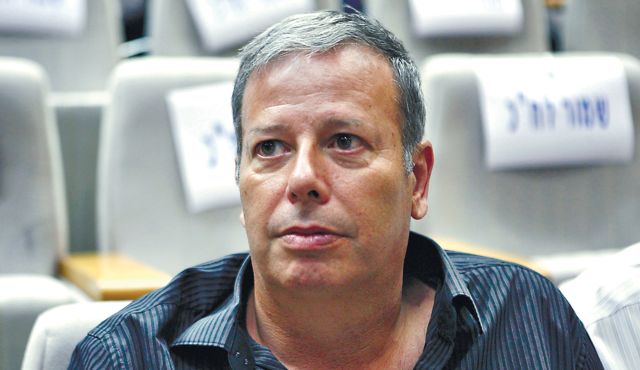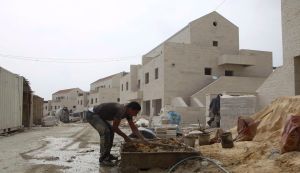Upper Nazareth mayor: No Arab school here as long as I am in charge
 Friday, January 18, 2013 at 11:12PM
Friday, January 18, 2013 at 11:12PM Mayor Shimon Gapso rejects appeal to set up an Arab school in the city, claiming the request conceals 'a provocative nationalist statement intended to disrupt the status quo.'
By Jack Khoury 17 January , 2013 Haaretz
 Upper Nazareth Mayor Shimon Gapso Photo by Tomer Appelbaum
Upper Nazareth Mayor Shimon Gapso Photo by Tomer Appelbaum
Upper Nazareth Mayor Shimon Gapso has turned down an appeal to set up an Arab school in the city, claiming the request conceals “a provocative nationalist statement intended to disrupt the status quo.”
“Upper Nazareth was founded to make the Galilee Jewish and must preserve this role,” Gapso said in his response to the Association of Civil Rights in Israel, which submitted the request earlier this month. He compared the establishment of an Arab school to a Muslim cemetery or a mosque in the city, and vowed this would not happen as long as he was mayor.
Although some 20 percent of Upper Nazareth’s 52,000 residents are Arabs, no Arab school operates in it and the city’s 1,900 Arab students must travel to schools outside the city, most of them in the adjacent city of Nazareth.
The parents appealed to the municipality to open an Arab school, saying Nazereth’s state-run schools can only take in a small number of students from out of town. This forces most of the Arab children and youth to enroll in private, much more expensive schools.
“The lack of adequate schools infringes on the Arab residents’ right to accessible, available education and on the equality of allocating public and municipal resources,” the parents say in their request, submitted by ACRI attorney Ashraf Elias.
“The Arab children in Upper Nazareth are deprived of free, available formal education in their own town and neighborhoods. This means the local authority and Education Ministry are hardly allocating any resources to the Arab children’s education, compared to the Jewish children’s education,” Elias wrote to Gapso.
The demand to establish an Arab school in Upper Nazareth has been made repeatedly over the past year by both residents and groups, but until recently the responses were evasive. A view of Upper Nazareth. Photo by Gil Eliahu
A view of Upper Nazareth. Photo by Gil Eliahu
ACRI’s request was submitted on January 7. Gapso responded the very next day, making it it clear that setting up Arab schools in Upper Nazareth, like a Muslim cemetery or mosque, was not going to happen as long as he was mayor.
“The city’s residents and I, as their leader, support the principle that Upper Nazareth must stick to this mission [of making the Galilee Jewish],” Gapso said.
He also said in his response that he and most of the city’s residents will do everything to prevent changing its character and losing its status as a Jewish enclave in the Galilee.
Gapso confirmed to Haaretz that he stands behind “every word” in his response. He said the Arab students’ claims are unjustified, because Upper Nazareth and Nazareth are one [school] registration area. Also, the city provides transportation to schools in Nazareth or neighboring communities according to the Education Ministry’s criteria, he said.
ACRI attorney Auni Banna said “the mayor’s angry response reflects a dangerous approach, which not only objects to the existence of Arab schools in Upper Nazareth but also denies the legitimate existence of Arabs in the city. The parents’ demand to enable their children to go to school in the city they live in is a basic right, and no city or mayor may deny it. Upper Nazareth’s mayor and every Israeli mayor would do well to advance justice and equality among his city’s residents,” he said.
About six weeks ago Gapso raised a storm when he asked the interior minister to declare Nazareth a “hostile city to Israel” and to cut off the state funding it receives.
Gapso accused Nazareth’s municipality of being a “fifth column” and the entire city of becoming “a nest of terrorism in the heart of the Galilee ... waiting for an opportunity to stab Israel in the back.”
Gapso made this statement after a protest rally in Nazareth against the IDF offensive in Gaza.
The Coalition Against Racism in Israel demanded to investigate Gapso and try him for incitement.
-----------------------------------------------------------------------------------
Israel election: Netanyahu 'will not dismantle settlements'
BBC News
January 18, 2013 - 12:00am
http://www.bbc.co.uk/news/world-middle-east-21075558
Israel's prime minister has said no Jewish settlements in the West Bank will be removed during his next term in office if he wins elections on Tuesday.
Benjamin Netanyahu told Israel's Maariv newspaper: "The days when bulldozers uprooted Jews are behind us, not in front of us."
The future of Jewish settlements has been a key stumbling block in peace talks with the Palestinians.
Polls predict Mr Netanyahu will comfortably win next week's polls.
About 500,000 Jews live in more than 100 settlements built in the West Bank and East Jerusalem since Israel occupied the area in 1967. The international community considers the settlements illegal, though Israel disputes this (!)sic
'Love for the land'
Asked if he could promise no settlements would be dismantled during the next four years, Mr Netanyahu replied: "Yes."
"We haven't uprooted any settlements, we have expanded them," he added. "Nobody has any lessons to give me about love for the Land of Israel or commitment to Zionism and the settlements."
A report this week by the Israeli settlements watchdog group Peace Now said tenders and approvals for construction in East Jerusalem had reached record levels under Mr Netanyahu's government.
<http://peacenow.org/images/Summary%20of%20the%204%20years%20of%20Netanyahu%20Government.pdf> (check out this excellent report on Israel’s settlement policies) by Peace Now.
It also said isolated settlements accounted for nearly 40% of all new constructions, nearly double that of previous years.
Mr Netanyahu has long championed settlements, but has also said he would be prepared to make "painful concessions" - alluding to some settlement withdrawals - in a final peace agreement with the Palestinians.
Palestinians insist all settlements must be removed from the West Bank and East Jerusalem, where they want to establish a future state.
Peace talks broke down over the issue of settlements in 2010 and Palestinians have refused to resume negotiations unless Israel freezes settlement building first.
The new Israeli government is expected to be one of the most right-wing in the country's history. There has been a surge of support for a new ultra-nationalist religious party, Bayit Yehudi, which calls for the annexation of large parts of the West Bank and is likely to form part of ruling coalition.
_________________________________________________________________________________________________________________
 APJP |
APJP |  Post a Comment |
Post a Comment |
Reader Comments